Enterprise keyword tools are vital for managing large-scale, multilingual SEO campaigns. They help businesses analyze search behavior, localize content, and optimize global rankings. With 60% of Google searches conducted in non-English languages, these tools go beyond translation to address regional nuances and audience preferences. Here’s a quick overview of the top tools:
- Semrush: 26.7 billion keywords, AI-powered tools, and pricing starting at $139.95/month.
- Ahrefs: 28.7 billion keywords, strong backlink analysis, starting at $129/month.
- Google Keyword Planner: Free, direct Google data, but limited for enterprise needs.
- SpyFu: Focused on competitor intelligence, starting at $39/month.
- Ubersuggest: User-friendly, multilingual support, lifetime pricing at $120.
- AccuRanker: Specialized in rank tracking, starting at $49/month.
Quick Comparison:
| Tool | Database Size | Strengths | Starting Price |
|---|---|---|---|
| Semrush | 26.7 billion | AI tools, local SEO, PPC | $139.95/month |
| Ahrefs | 28.7 billion | Backlink analysis, SEO focus | $129/month |
| Google Keyword Planner | N/A | Free, direct Google data | Free |
| SpyFu | 109 million domains | Competitor insights | $39/month |
| Ubersuggest | 1.25 billion | Easy to use, multilingual | $120 lifetime |
| AccuRanker | Rank tracking focus | Global rank monitoring | $49/month |
Each tool offers unique advantages depending on your needs, whether it’s deep SEO insights, competitor tracking, or localized keyword strategies.
🌏 One source of truth for SEO: how global brands stay consistent at scale
Key Features of Global Enterprise Keyword Tools
Managing global SEO campaigns is no small feat, and enterprise keyword tools need to go beyond basic keyword research. These tools must address the complexities of multi-language, multi-regional strategies at scale.
Multi-Language and Regional Keyword Databases
Having access to keyword data across multiple languages and regions is the bedrock of global SEO success. Why? Because 76% of consumers prefer to shop on websites in their native language, which reflects their natural search behavior.
The best enterprise keyword tools offer extensive regional keyword databases that capture how people search in different languages and locations. It's not just about translating keywords - it’s about understanding the nuances of local search habits. For example, 70% of online search queries are conducted in languages other than English.
These tools provide regional search volume data, competition levels, and cultural context for keywords. This allows businesses to fine-tune their metadata with localized keywords and create content that resonates with the specific terminology and behavior of their target audiences. In short, these multilingual features lay the groundwork for the more advanced capabilities discussed next.
Advanced Filtering and Competitor Analysis
When dealing with international SEO at scale, advanced filtering and competitor analysis become indispensable. Enterprise tools need to sift through massive amounts of keyword data to identify the best opportunities for each market. Advanced filters help streamline this process by focusing on high-value keywords based on factors like search intent, competition, search volume, and regional performance. This is especially critical when you consider that the top spot on Google garners a 27% click-through rate, while results on the second page barely get noticed with a 0.63% CTR.
Competitor analysis tools further enhance these insights by showing how rivals perform across various regions and languages. They help businesses pinpoint their position in the market and uncover content gaps to exploit. These tools also examine competitor backlink profiles and on-page elements like headers and metadata, offering a window into how competitors optimize for specific regions. Armed with this information, companies can adjust their strategies to stay ahead in each market.
Integration and Team Scalability Features
For enterprise keyword tools to truly empower global SEO efforts, they must integrate seamlessly with other platforms while supporting large, distributed teams. Integration with analytics tools, content management systems (CMS), and automation platforms simplifies key tasks like generating hreflang tags, creating canonical links, and adding locale-specific markup. These automated processes not only reduce human error but also ensure smooth operations across multiple markets.
Additionally, these tools support collaborative workflows by offering role-based access and automated performance alerts, which help maintain consistency across global campaigns. This structure is vital for managing legal requirements in different regions, such as cookie notices, pricing formats, and disclaimers.
Top Enterprise Keyword Tools Review
Each tool in this roundup tackles the complex needs of global SEO in its own way. Here's how the top tools measure up for international businesses.
Semrush
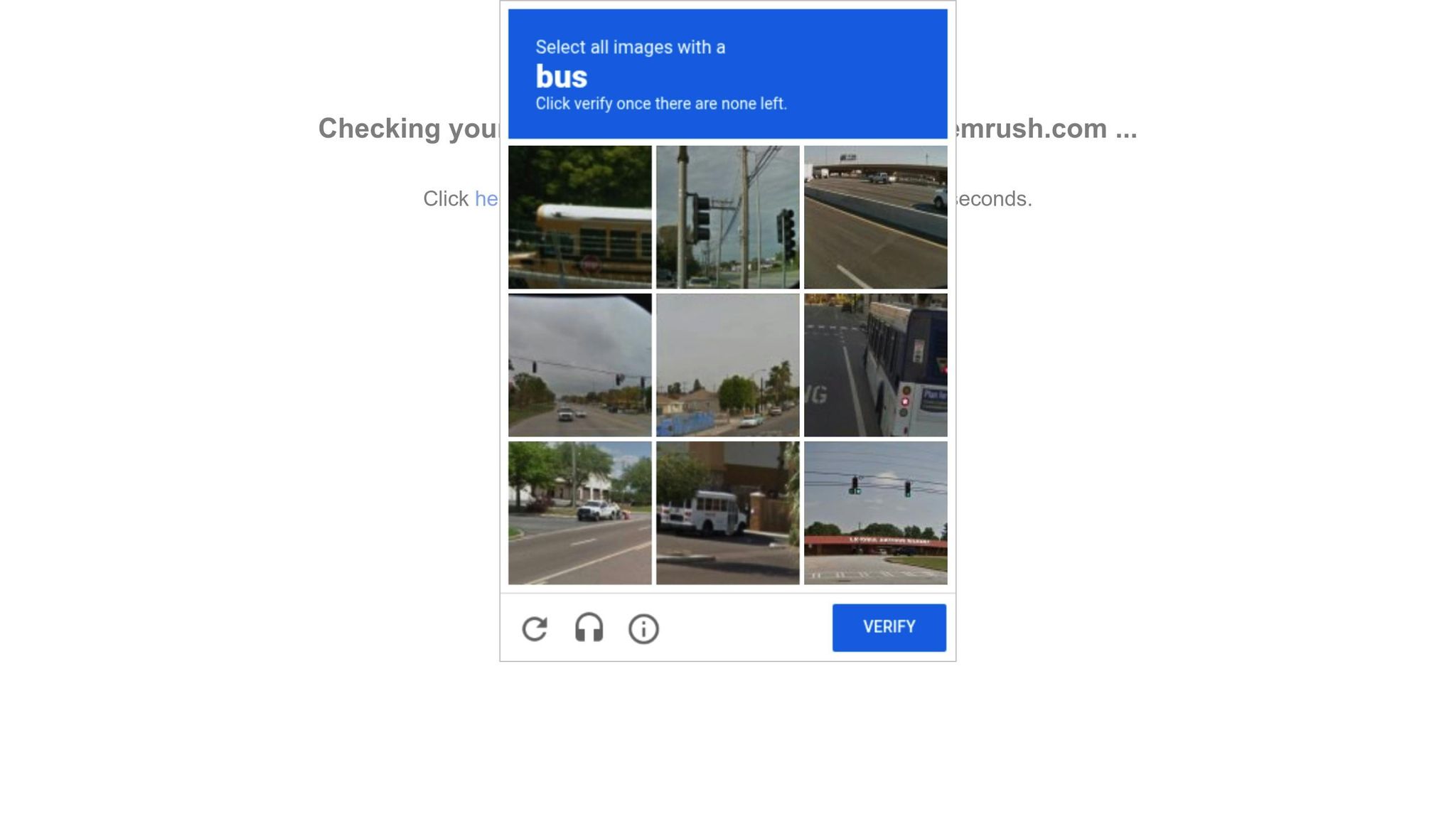
Semrush shines in global keyword discovery with its AI-powered Keyword Magic Tool, which boasts a massive database of 26.7 billion keywords spanning 142 countries. Its Market Explorer tool identifies promising growth opportunities by analyzing traffic trends across different regions. Semrush provides key metrics like search volume, intent, CPC, difficulty, and trends, and it leads in U.S. keyword coverage with 3.6 billion keywords.
Beyond keywords, Semrush offers a wide range of marketing tools for integrated digital insights. Andrew Warden, Chief Marketing Officer at Semrush, highlights its relevance in today's SEO landscape:
"Google's AI Overviews now appear in over 13% of all searches - and that number continues to climb. We know that inclusion isn't random; it's a trust signal. Brands that create consistent and expert-level content power AI answers. In this new SEO landscape, authority doesn't just rank - you become the answer."
Pricing starts at $139.95 per month for the Pro plan, $249.95 per month for the Guru plan, and $449.95 per month for the Business plan. Next, let’s dive into Ahrefs Keywords Explorer, another heavy hitter in the keyword research space.
Ahrefs Keywords Explorer
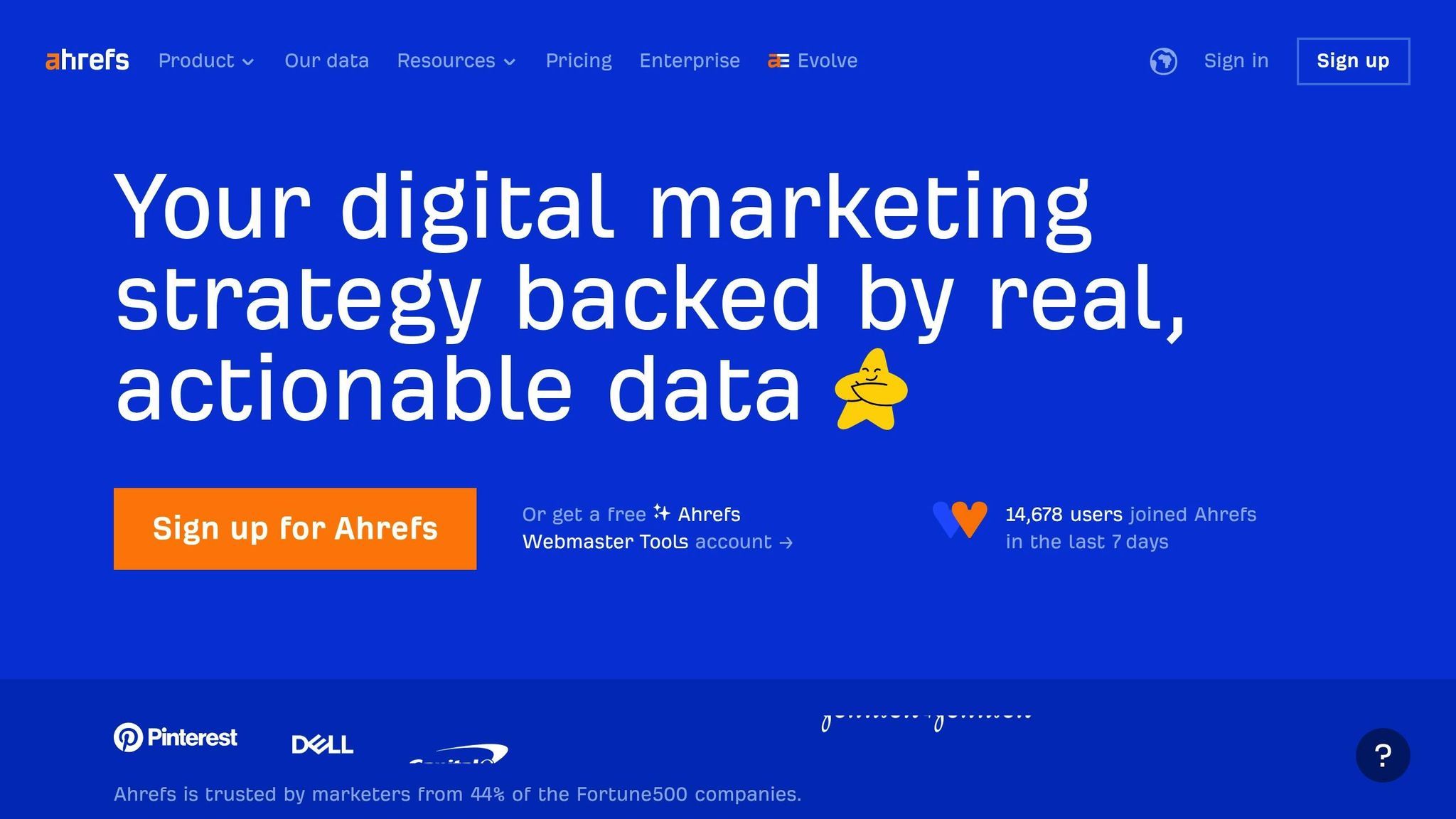
Ahrefs Keywords Explorer offers a competitive edge in global keyword research with its database of 28.7 billion keywords across 217 countries. It provides critical SEO metrics like search volume, keyword difficulty, traffic potential, clicks, CPC, and parent topic analysis. Its detailed SERP analysis and advanced difficulty metrics make it easier to prioritize opportunities in diverse markets.
In 2023, Ahrefs introduced features that enhance its global capabilities. The AI keyword translator allows users to translate keyword lists into any language, complete with search volume data for specific countries. Additionally, the Multilingual SEO Matrix helps users structure global SEO strategies by organizing efforts across languages and regions. Ahrefs also supports ranking data from over 190 countries, but its keyword insights rely on third-party clickstream data and modeling.
Ahrefs pricing starts at $29 per month for the Starter plan, $129 per month for the Lite plan, $249 per month for the Standard plan, $449 per month for the Advanced plan, and $1,499 per month for the Enterprise plan. It’s especially strong in backlink and competitor analysis, making it a go-to choice for SEO-driven projects.
Google Keyword Planner
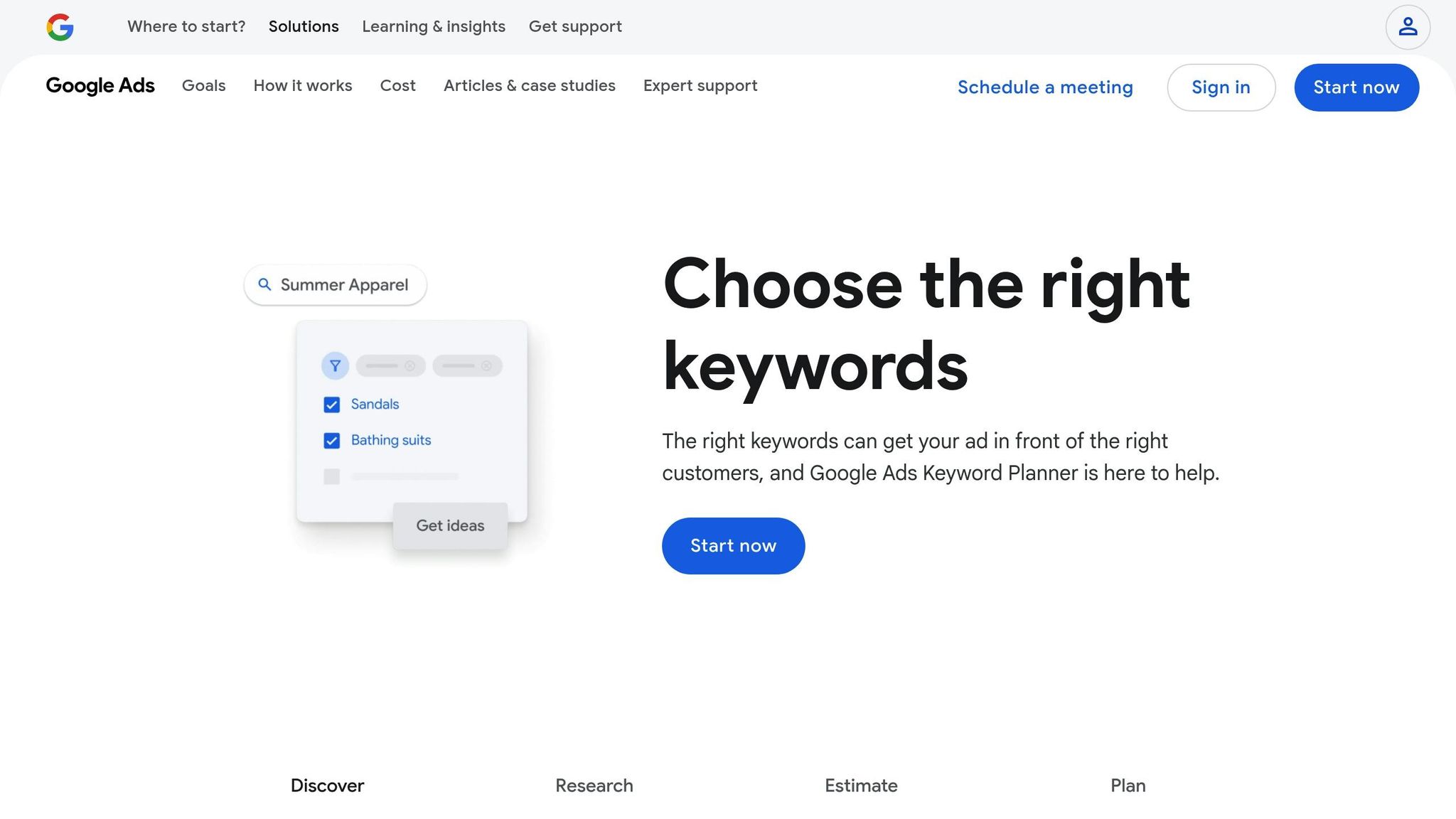
Google Keyword Planner offers direct access to Google's search data, making it a valuable tool for basic global campaigns. Its integration with Google Ads allows businesses to seamlessly transition from keyword research to paid advertising, leveraging first-party data that other tools can't match.
That said, the tool has its limitations. With 46% of keyword data hidden, it lacks the depth needed for comprehensive enterprise strategies. While it provides baseline keyword insights, its advanced filtering, competitor analysis, and team collaboration features fall short for complex global campaigns. Google Keyword Planner is best used as a supplementary tool alongside more robust enterprise platforms.
Other Global Keyword Research Tools
Beyond the enterprise-level platforms discussed earlier, there are several specialized tools that provide additional insights for global keyword research. These tools bring unique features to the table, making them excellent complements to broader SEO strategies.
SpyFu
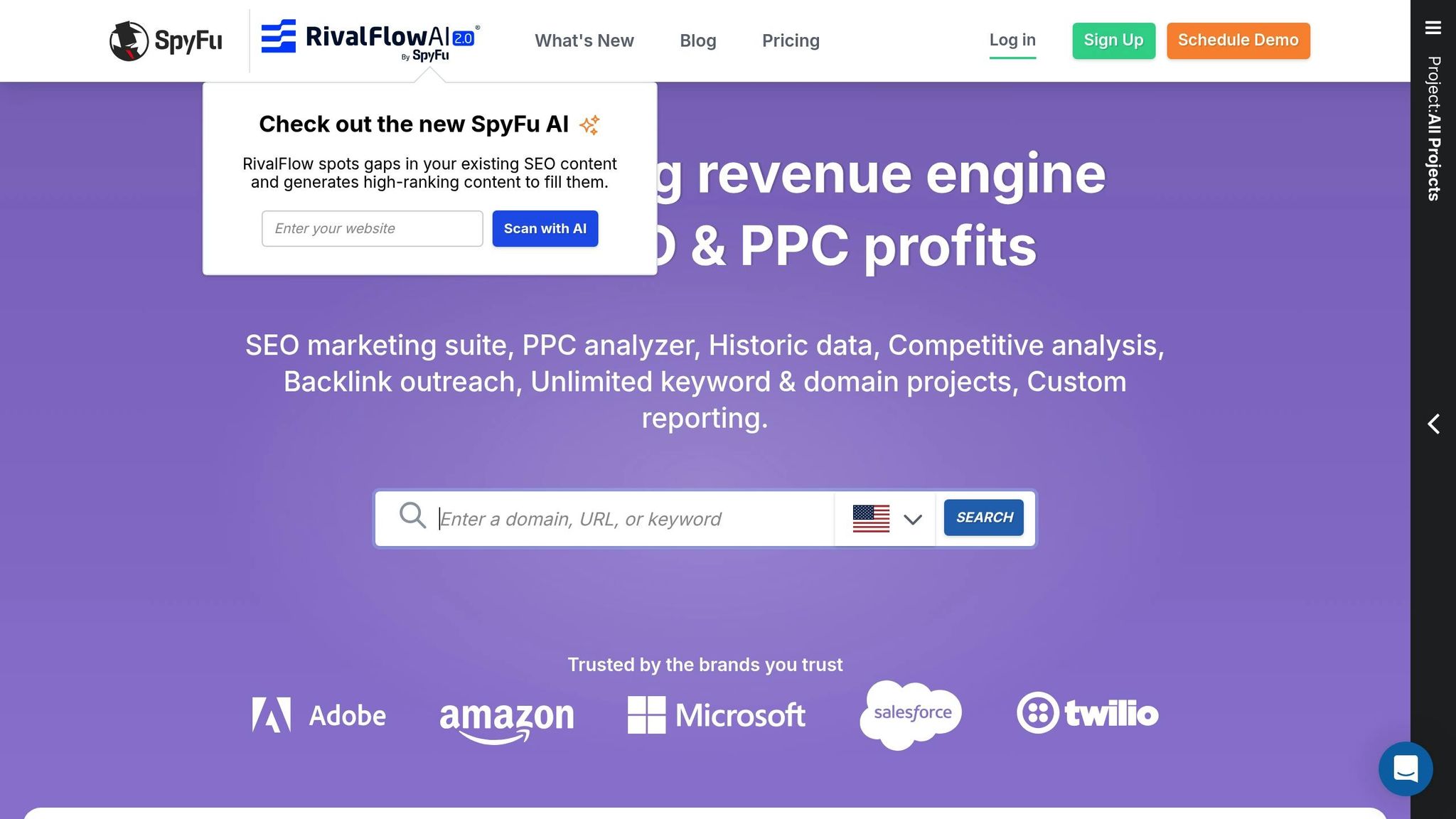
SpyFu is a standout when it comes to competitive intelligence and historical data. With tracking for 109 million domains and 14 years of historical data, it offers a treasure trove of insights into competitor strategies across various markets.
The platform excels at revealing competitor AdWords campaigns and paid search strategies. While its strength lies in competitor analysis rather than improving individual site performance, it’s a powerful tool for understanding market dynamics. SpyFu has an 89% user sentiment rating based on 133 reviews, and its Basic plan starts at $33 per month.
Ubersuggest
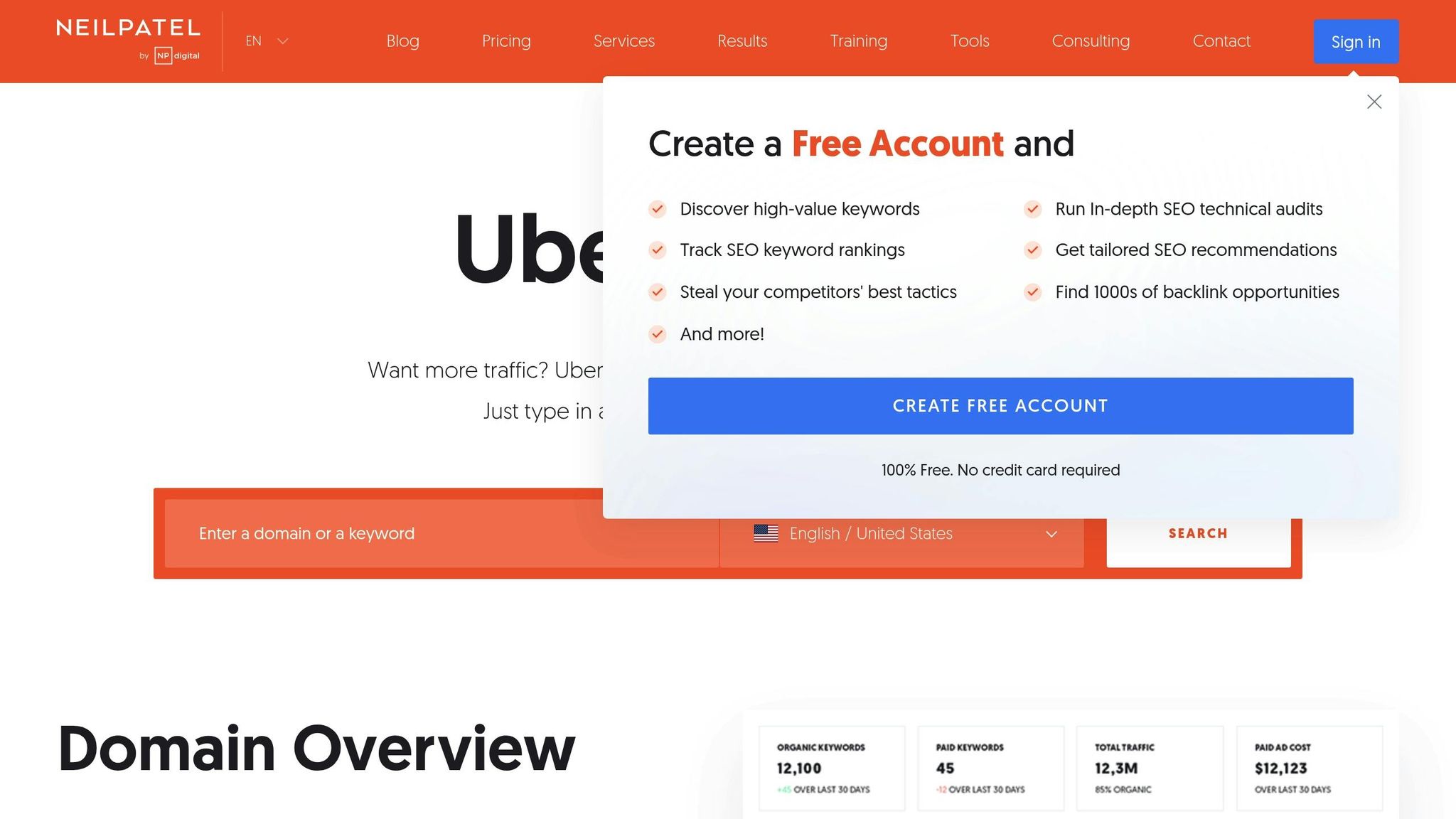
Ubersuggest is designed for teams seeking straightforward, global keyword insights. With a database of 1.25 billion keywords and 3 million users, it’s an accessible tool for content strategy and market research. Its user-friendly interface, combined with multilingual support, makes it a solid choice for international teams. Additionally, its site audit feature helps identify technical SEO issues that might impact rankings in different regions.
The tool has an 88% user sentiment rating based on 116 reviews, and its pricing offers value at $120 for a lifetime subscription. However, some users have noted limitations in its backlink tracking and data depth compared to more advanced enterprise platforms. Ubersuggest is best suited as a starting point for content planning and search engine marketing.
AccuRanker
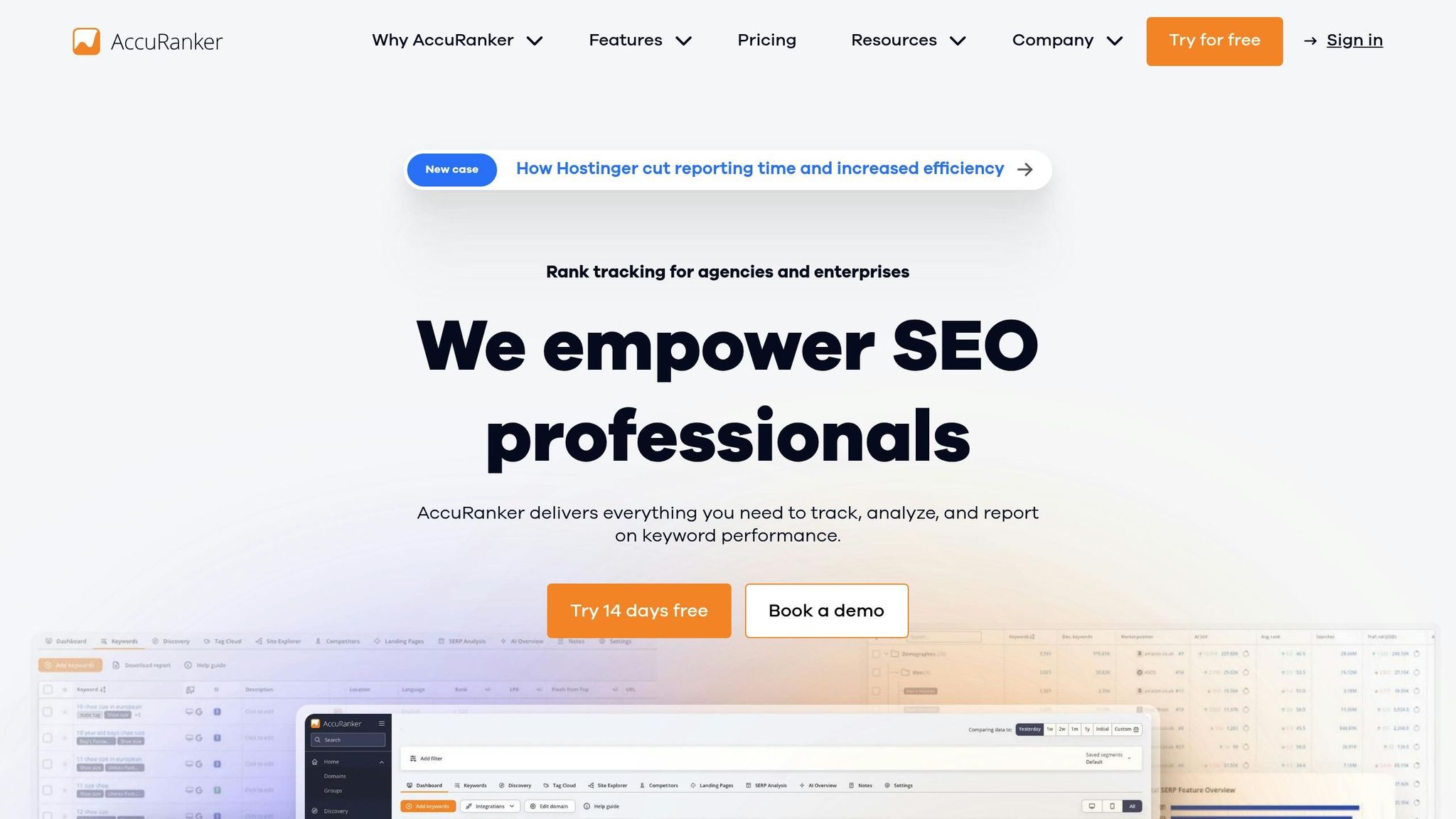
AccuRanker specializes in rank tracking and reporting, specifically tailored for global SEO campaigns. It’s ideal for monitoring keyword performance across regions and languages, making it a go-to for enterprise teams managing large, multilingual websites.
With plans starting at $49 per month for tracking up to 500 keywords, AccuRanker offers scalability and customization options that are essential for large-scale SEO efforts. While it doesn’t cover the full spectrum of keyword research, it’s an excellent tool for tracking and reporting on rankings.
These tools serve as valuable additions to enterprise platforms, offering unique perspectives and specialized features to enhance global SEO strategies.
sbb-itb-5be333f
Enterprise Keyword Tools Comparison
Selecting the right enterprise keyword tool means weighing factors like database size, features, and global reach. Here's a detailed comparison to help you make an informed decision.
Tool Comparison Table
| Tool | Database Size | Key Strengths | Starting Price | Best For |
|---|---|---|---|---|
| Semrush | 26.5 billion keywords in 142 locations | All-in-one marketing suite, PPC integration, local SEO | $139.95/month | Comprehensive marketing campaigns |
| Ahrefs | 28.7 billion keywords in 217 locations | Superior backlink analysis, pure SEO focus | $108/month | Deep SEO insights and link building |
| Google Keyword Planner | Google's complete database | Direct Google data, PPC planning | Free | Budget-conscious research |
| SpyFu | 109 million domains tracked | Competitive intelligence, 14 years historical data | $39/month | Competitor analysis |
| Ubersuggest | 1.25 billion keywords | User-friendly interface, lifetime option | $29/month | Content planning and beginners |
| AccuRanker | Rank tracking focused | Global rank monitoring, custom reporting | $49/month | Performance tracking |
Key Highlights and Differences
The database sizes of these tools hint at their strengths. Ahrefs leads with 28.7 billion keywords across 217 locations, making it ideal for global SEO campaigns. On the other hand, Semrush excels in the U.S. market, covering 142 locations and offering a broader suite of marketing tools.
When it comes to backlink tracking, Semrush and Ahrefs stand out. Semrush tracks 43 trillion backlinks and 390 million referring domains, while Ahrefs monitors 35 trillion backlinks and 267 million referring domains. This makes Semrush the go-to for all-around marketing needs, while Ahrefs is better suited for those prioritizing in-depth SEO and link-building efforts. As SEO expert Victoria Kurichenko points out:
"Semrush is great for an all-around marketing approach, while Ahrefs is great for deep SEO insights and backlink tracking."
Semrush offers over 55 tools covering SEO, PPC, social media, and content marketing, making it a comprehensive choice for enterprises. Meanwhile, Ahrefs focuses solely on SEO and lacks features like local SEO, which might be a drawback for businesses targeting specific regions.
Google Keyword Planner is a free tool that provides direct data from Google, making it a solid choice for PPC planning. However, it lacks tracking capabilities, which limits its utility for ongoing SEO efforts.
Global Reach and Special Features
For businesses operating on a global scale, tools like BrightEdge and seoClarity offer distinct advantages. BrightEdge supports 145 countries and 46 languages, while seoClarity uses advanced matching to identify keywords in foreign markets, even without language-specific expertise. These global capabilities underline the importance of aligning your tool choice with your specific SEO demands.
Semrush also supports cross-platform rank tracking across search engines like Bing, Baidu, and even ChatGPT, which is a unique advantage for enterprises needing insights beyond Google. In contrast, Ahrefs focuses exclusively on Google rankings.
Final Thoughts
For SEO teams looking for depth, Ahrefs delivers unmatched backlink analysis and keyword difficulty tools. However, for enterprises managing integrated marketing campaigns, Semrush provides a more versatile solution with features like PPC integration and local SEO capabilities. As Victoria Kurichenko explains:
"Ahrefs is great if you purely focus on SEO, but it doesn't have local SEO features."
Ultimately, your choice will depend on your specific goals - whether it's digging deep into SEO or running comprehensive, multi-channel marketing campaigns.
Top SEO Marketing Directory Resource
Navigating the landscape of global SEO, especially when dealing with multiple markets, can be a daunting task. The Top SEO Marketing Directory simplifies this process by offering a curated list of enterprise-level keyword research tools specifically tailored for multilingual and international SEO strategies. This resource helps businesses compare tools efficiently, ensuring they find the best fit for their global needs.
Why is this important? Consider this: only about one-quarter of websites are in English. This statistic highlights the growing need for tools that go beyond basic translation. Effective multilingual SEO requires sophisticated keyword research tools that can handle the nuances of different languages and regions.
Evaluation Criteria for Global Keyword Tools
The directory evaluates tools based on critical factors that contribute to global SEO success. One of the main considerations is database coverage. For instance, seoClarity boasts a database of over 30 billion keywords spanning more than 170 countries, with an additional 1 billion keywords added monthly.
But it’s not just about quantity. The directory prioritizes tools that focus on localized keyword discovery rather than simple translations - a key element in creating meaningful connections with diverse audiences. Additionally, the ability to integrate seamlessly into workflows and scale across multiple markets is a standout feature of the tools highlighted.
Proven Results from Directory-Listed Tools
The directory doesn’t just list tools; it also showcases their real-world impact. For example:
- A digital marketing agency reported a 45% increase in organic traffic after optimizing its keyword strategy with SEMrush.
- An online retailer achieved a 50% improvement in search visibility by leveraging Ahrefs for keyword optimization.
These success stories underscore the value of using the right tools. As Ryan Erwin puts it:
"Keyword discovery is one of the core pillars of effective search marketing. Done regularly, it can help you form a robust content strategy and improve your SEO ranking long term. The effect is more traffic, conversions, and ultimately revenue."
Streamlined Comparison Process
To make the selection process even easier, the directory offers side-by-side evaluations of enterprise-grade tools. This streamlined approach allows businesses to quickly identify solutions that align with their specific SEO goals - whether they’re looking for cost-effective options or comprehensive platforms designed for large-scale operations.
Actionable Implementation Guidance
The directory goes beyond tool recommendations by offering practical advice on implementing multilingual SEO strategies. It emphasizes that success in global SEO requires more than just the right tools. Key strategies include:
- Creating localized versions of your website.
- Developing unique, multilingual content tailored to specific regions.
- Ensuring optimal website performance across different markets.
The directory also stresses the importance of understanding regional nuances. This means working with local experts who can provide insights into cultural and language preferences. Many of the tools featured in the directory support collaboration with local teams and offer region-specific data to help brands refine their strategies.
Choosing the Right Global SEO Tool
When it comes to global SEO, picking the right enterprise keyword tool is all about understanding your business's unique needs - especially if you're managing campaigns across multiple languages and international markets.
Scale matters. Enterprise websites often have millions of pages, each targeting numerous keywords. Your tool needs to handle this massive volume while keeping up with frequent updates as new products or services are introduced. This makes scalability and the ability to manage evolving keyword data a top priority.
Another critical factor is data segmentation by region and language. To track rank variations effectively across different country-specific search engines, your tool should offer precise options for regional targeting. For instance, with Semrush, you can set up a project, choose the relevant search engine and device, and specify the location you want to monitor.
Beyond just tracking keywords, focus on user intent. Avoid chasing high-volume keywords that fail to convert. Instead, look for tools that integrate with marketing and business intelligence platforms to give you a broader perspective on performance.
Resource management plays a big role in optimizing your global strategy. By prioritizing the right keywords and maintaining accurate tracking across search engines, you can align your efforts with your global expansion goals. If you're targeting specific regions, features like local SEO tracking - such as monitoring Google My Business listings or Google's Local "Snack Pack" - are indispensable.
To simplify the decision-making process, turn to resources like the Top SEO Marketing Directory. These curated comparisons of enterprise-grade tools are tailored for global SEO, helping you identify the best options for your expansion plans. It's also wise to evaluate the local search landscape in each target market and collaborate with international marketing experts for insights into regional trends.
Finally, remember that multilingual SEO goes beyond translation. To succeed globally, you need to understand your audience's search habits and cultural nuances. This deeper connection is what drives real results.
FAQs
How do enterprise keyword tools help manage SEO for multilingual and multi-regional websites?
Enterprise keyword tools make handling SEO for multilingual and multi-regional websites much more manageable by offering automation and localization capabilities. They take care of essential tasks like keyword research, content optimization, and performance tracking across different languages and regions, saving both time and effort.
These tools also dig into regional search trends, local search behaviors, and cultural preferences, helping you fine-tune your SEO approach for each specific market. By automating repetitive tasks and delivering advanced analytics, they enable businesses to scale their global SEO efforts efficiently while keeping strategies consistent and relevant for diverse audiences.
What’s the difference between free keyword tools like Google Keyword Planner and paid enterprise tools for global SEO?
When comparing free tools like Google Keyword Planner to paid enterprise keyword tools, the differences come down to data quality, features, and scalability. Free tools work well for basic keyword research but often fall short in terms of the depth and variety of data they provide. Advanced options and functionalities are usually missing too.
In contrast, paid enterprise tools offer detailed keyword insights, precise metrics, and advanced features such as competitor analysis, multi-language capabilities, and localization options. These tools are built to manage the challenges of global SEO campaigns, making them a must-have for businesses aiming to reach international audiences.
How can businesses use competitor analysis in enterprise keyword tools to enhance their global SEO efforts?
Enterprise keyword tools offer businesses a powerful way to analyze their competitors and sharpen their strategies. By examining competitors' top-performing keywords, backlink sources, and traffic trends, companies can spot opportunities to enhance their own SEO efforts and even discover untapped market segments.
These tools also provide insights into competitors' backlink profiles, highlighting authoritative websites that could be approached for link-building opportunities. Keeping a close eye on competitors' performance helps businesses stay in tune with market trends, maintain a competitive edge in global markets, and boost their international search rankings.


